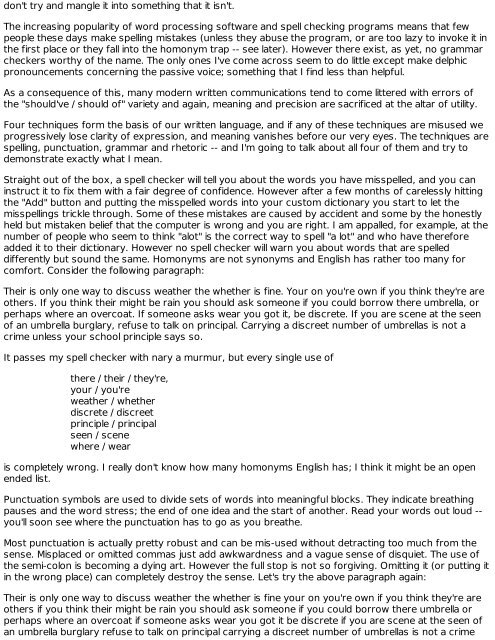Triffids Beard 2 - The Bearded Triffid
Triffids Beard 2 - The Bearded Triffid
Triffids Beard 2 - The Bearded Triffid
You also want an ePaper? Increase the reach of your titles
YUMPU automatically turns print PDFs into web optimized ePapers that Google loves.
don't try and mangle it into something that it isn't.<br />
<strong>The</strong> increasing popularity of word processing software and spell checking programs means that few<br />
people these days make spelling mistakes (unless they abuse the program, or are too lazy to invoke it in<br />
the first place or they fall into the homonym trap -- see later). However there exist, as yet, no grammar<br />
checkers worthy of the name. <strong>The</strong> only ones I've come across seem to do little except make delphic<br />
pronouncements concerning the passive voice; something that I find less than helpful.<br />
As a consequence of this, many modern written communications tend to come littered with errors of<br />
the "should've / should of" variety and again, meaning and precision are sacrificed at the altar of utility.<br />
Four techniques form the basis of our written language, and if any of these techniques are misused we<br />
progressively lose clarity of expression, and meaning vanishes before our very eyes. <strong>The</strong> techniques are<br />
spelling, punctuation, grammar and rhetoric -- and I'm going to talk about all four of them and try to<br />
demonstrate exactly what I mean.<br />
Straight out of the box, a spell checker will tell you about the words you have misspelled, and you can<br />
instruct it to fix them with a fair degree of confidence. However after a few months of carelessly hitting<br />
the "Add" button and putting the misspelled words into your custom dictionary you start to let the<br />
misspellings trickle through. Some of these mistakes are caused by accident and some by the honestly<br />
held but mistaken belief that the computer is wrong and you are right. I am appalled, for example, at the<br />
number of people who seem to think "alot" is the correct way to spell "a lot" and who have therefore<br />
added it to their dictionary. However no spell checker will warn you about words that are spelled<br />
differently but sound the same. Homonyms are not synonyms and English has rather too many for<br />
comfort. Consider the following paragraph:<br />
<strong>The</strong>ir is only one way to discuss weather the whether is fine. Your on you're own if you think they're are<br />
others. If you think their might be rain you should ask someone if you could borrow there umbrella, or<br />
perhaps where an overcoat. If someone asks wear you got it, be discrete. If you are scene at the seen<br />
of an umbrella burglary, refuse to talk on principal. Carrying a discreet number of umbrellas is not a<br />
crime unless your school principle says so.<br />
It passes my spell checker with nary a murmur, but every single use of<br />
there / their / they're,<br />
your / you're<br />
weather / whether<br />
discrete / discreet<br />
principle / principal<br />
seen / scene<br />
where / wear<br />
is completely wrong. I really don't know how many homonyms English has; I think it might be an open<br />
ended list.<br />
Punctuation symbols are used to divide sets of words into meaningful blocks. <strong>The</strong>y indicate breathing<br />
pauses and the word stress; the end of one idea and the start of another. Read your words out loud -you'll<br />
soon see where the punctuation has to go as you breathe.<br />
Most punctuation is actually pretty robust and can be mis-used without detracting too much from the<br />
sense. Misplaced or omitted commas just add awkwardness and a vague sense of disquiet. <strong>The</strong> use of<br />
the semi-colon is becoming a dying art. However the full stop is not so forgiving. Omitting it (or putting it<br />
in the wrong place) can completely destroy the sense. Let's try the above paragraph again:<br />
<strong>The</strong>ir is only one way to discuss weather the whether is fine your on you're own if you think they're are<br />
others if you think their might be rain you should ask someone if you could borrow there umbrella or<br />
perhaps where an overcoat if someone asks wear you got it be discrete if you are scene at the seen of<br />
an umbrella burglary refuse to talk on principal carrying a discreet number of umbrellas is not a crime


